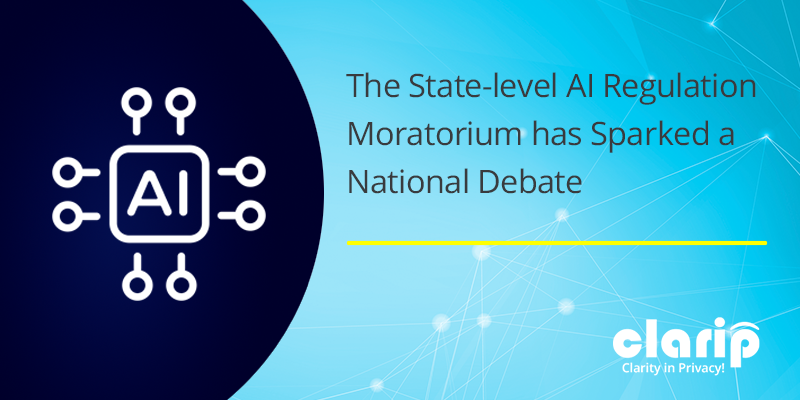The State-level AI Regulation Moratorium has Sparked a National Debate

AI continues to become increasingly embedded in every connected interaction from ecommerce to healthcare. Because of this, U.S. lawmakers are at a pivotal crossroads: should individual states continue to lead on AI regulation – like data privacy regulation – or should Washington hit the brakes? A newly proposed federal moratorium on state-level AI regulations has triggered intense debate, with major implications for businesses across the country.
The Proposal: A 10-Year Moratorium on State AI Laws
The U.S. House of Representatives recently passed a legislative package that includes a controversial 10-year moratorium on state laws regulating AI systems involved in interstate commerce. In response, Senate Republicans have proposed a revised version to preserve the moratorium with modifications, but it has sparked bipartisan opposition. Lawmakers on both sides argue it could limit states’ ability to address AI-related harms like bias, misinformation, surveillance, and misuse of biometric data.
Critics view the provision as federal overreach that weakens consumer protection in the absence of clear national standards. Despite the pushback, the moratorium remains in the Senate’s current draft. As of June 2025, it has not been finalized and is still under active debate, creating regulatory uncertainty for businesses and AI developers.
Supporters argue that AI is a global technology that requires a unified federal approach. They warn that a patchwork of state regulations could hinder innovation and impose burdensome compliance requirements on companies operating nationwide.
Why This Matters for Companies
Whether you’re a startup experimenting with generative AI or a Fortune 500 firm deploying large-scale automation, this moratorium will reshape how you operate in the U.S. Here’s how:
Short-Term Certainty, Long-Term Ambiguity. Companies may initially welcome a uniform, federal-only regulatory framework. A pause on state-by-state compliance could reduce legal costs and development delays, especially for companies working across multiple jurisdictions.
But without clarity on what federal rules will look like, the pause could amount to a regulatory vacuum. If Congress doesn’t act quickly to pass clear national guidelines, companies may be forced to navigate murky ethical terrain with limited legal guardrails.
Innovation Tailwinds for Tech Giants and Startups. For open-source developers and AI startups, the moratorium might offer breathing room. Regulatory uncertainty has already spooked investors and stifled smaller firms trying to compete in AI spaces dominated by Big Tech. A temporary reprieve from state restrictions could accelerate experimentation and product rollout.
However, consumer trust is becoming a critical differentiator. Companies that ignore ethical AI practices in the absence of regulation could find themselves facing reputational backlash – even if they’re operating within legal boundaries.
Fragmentation Might Reemerge Anyway. States like California, New York, and Tennessee have already passed laws addressing specific AI-related concerns, such as deepfakes, surveillance, and biometric data use. A federal moratorium could spark resistance from state governments and even legal challenges over states’ rights. Businesses may still face enforcement actions or lawsuits under consumer protection or civil rights laws interpreted to cover AI harms.
Compliance Departments Will Stay Busy. While the moratorium could pause new state regulations, it would not erase existing privacy and algorithmic bias laws that touch on AI systems. For example, California’s CCPA/CPRA already requires businesses to disclose and offer opt-outs for automated decision-making. The EU’s AI Act and Canada’s proposed AIDA add international pressure, meaning U.S.-based firms with global reach can’t afford to relax their governance programs.
What Should Companies Do Now?
Whether or not the Senate enacts the moratorium, companies should prepare for a highly dynamic AI regulatory environment. Here’s how to stay ahead:
- Conduct AI Impact Assessments: Identify how your AI systems affect consumers, especially in sensitive areas like employment, lending, and healthcare.
- Monitor State and Federal Developments: Stay informed about both enacted and proposed laws and consider joining cross-industry coalitions to influence rulemaking.
- Implement Voluntary Ethics and Risk Frameworks: Follow guidelines from NIST, ISO, or industry associations to self-regulate where the law has not yet caught up.
- Design for Transparency: Develop easy-to-understand disclosures for users affected by AI decisions and maintain human oversight for high-stakes use cases.
The Road Ahead
The proposed AI moratorium has spotlighted a fundamental tension in American governance: balancing innovation with protection, and national consistency with local control. For businesses, the outcome of this legislative debate may determine not just how they build and deploy AI, but how they earn the trust of users, regulators, and investors in the years to come.
The next chapter, written in the Senate and in statehouses across the country, will reveal whether this proposed “pause” leads to progress or paralysis. Either way, companies cannot afford to wait. The age of AI governance is already here.
Looking for more Case Studies?
For more information, contact sales@clarip.com,
or call Clarip at 1-888-252-5653 to get started.
Mike Mango
COO & SVP, Enterprise Accounts
mmango@clarip.com
(646) 983-4618

 Data Risk Intelligence
Data Risk Intelligence Automated Data Mapping
Automated Data Mapping Do Not Sell/Do Not Share
Do Not Sell/Do Not Share Cookie Banner Solutions
Cookie Banner Solutions Consent & Preferences
Consent & Preferences Data Rights Requests
Data Rights Requests
